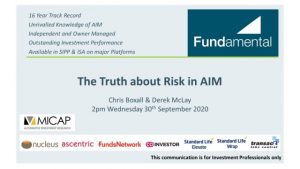Sunak scraps the Budget – should AIM tax reliefs be enhanced?
The popular press had previously alluded to the potential withdrawal of Inheritance Tax/Business Relief on AIM shares. With Chancellor Sunak scrapping his autumn Budget, as he focuses on matters of more immediate concern to the economic welfare of the country, any adverse tax changes for holders of AIM shares therefore appear to be off the table for the time being.
As we have suggested before, the Chancellor may be more inclined to extend tax reliefs for those supporting smaller companies in an effort to unlock the considerable savings held by the wealthier members of the population, which are effectively being eroded due to inflation and the derisory interest available on savings accounts.
The poor returns generated by the main UK stock market over the last decade and the significant outperformance of AIM portfolios over this period also suggests that investors would have been far better off investing in smaller, faster growing companies on AIM, than many of the aged dinosaurs of the main market.
Numerous small AIM pharmaceutical and biotech groups have been at the forefront of developing tests and vaccines in the battle against Covid-19. This has not been possible without the support of their shareholders, many of whom have been encouraged to invest with the added attraction of various tax reliefs.
Specialist research house, Equity Development, previously highlighted the huge benefits AIM brings to the UK economy and how the mild encouragement provided by the Inheritance Tax concession to those considering an IPO onto AIM is a very large multiple of the cost in tax foregone by HMRC.
Equity Development considers AIM companies contributed over £33bn Gross Value Added (GVA) directly – over 40% more per employee than the national average – and just as much indirectly to the UK economy since their direct GVA has increased by 35% in the last five years, more than twice as fast as the average. Not only are AIM companies more productive than average, their productivity is growing – at 11% pa, significantly faster than average.
A report by Grant Thornton on AIM’s first 25 years shows that small companies listed on AIM perform ‘better’ – generating more added value, more employment and far greater tax receipts for HMRC – than comparable “private” companies.
AIM’s superior growth has, in just the last five years, added £4.7bn pa to UK economy and more than £1bn per annum to HMRC. Rishi, take note!
Many investors and advisers are fearful of the perceived extra risk of investing in AIM. Our forthcoming webinar ‘The Truth about Risk on AIM’ will cover this and other misconceptions about AIM. You can register for the event by visiting the link here.
Not only is AIM of huge benefit to the UK economy but AIM listed companies represent the primary source of growth for UK small cap investors, reflected in the significant outperformance of AIM for IHT managers, including Fundamental, over the past decade or more.
Since launch on 19 June 1995, AIM has supported nearly four-thousand growth companies in raising over £117bn, 61% of which has been through follow-on fundraisings. The equity fund raisings over the pandemic have seen investors plough £billions into UK companies, removing a further burden from the government. For the eight months to the end of August AIM companies have raised £3.6 billion of follow-on capital.
We reiterate our suggestions that, for a limited period, the UK government should actually consider enhancing the tax incentives for investing in the newly issued shares of UK listed companies, whatever their size, whether on the main market or AIM. Now that’s a radical thought!
Chris Boxall
Cofounder & Co-Director
Please join the Fundamental team at our webinar ‘The Truth about Risk in AIM’.
Click the picture below to register..
You can find out more about Fundamental Asset Management’s high performing AIM portfolio service, which has been delivering exceptional investment returns for more than 16 years, from the link here.


